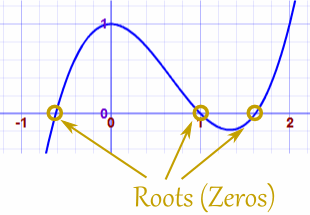The Fundamental Theorem of Algebra
- The fundamental theorem of algebra states that every non-constant single-variable polynomial with complex coefficients has at least one complex root
-
In the complex number system, every nth-degree polynomial function has precisely n zeros
- Complex Numbers: adding real numbers to real multiples of the imaginary unit, such as i
- Steps:
- Factor out
- Factor x^2+4
- Write the polynomial as a product of linear functions
- list the zeros left in the parenthesis

A root (zero) is where the polynomial is equal to zero 
Polynomials can be written in this form as well 
This is because it is the highest degree in the polynomial equation
Example: Find the roots of x^2-9step one: Add 9 to each side x^2=9Step two: Take the square root of each term x =3, x =-3Extra help, checkout these sites and videos for better and further explanations- Polynomials-Fundamental Theorem of Algebra
- Finding complex zeros of a polynomial function
- Fundamental theorem of algebra explanation
- Daves crash course of complex numbers in The fundamental Theorem

No comments:
Post a Comment